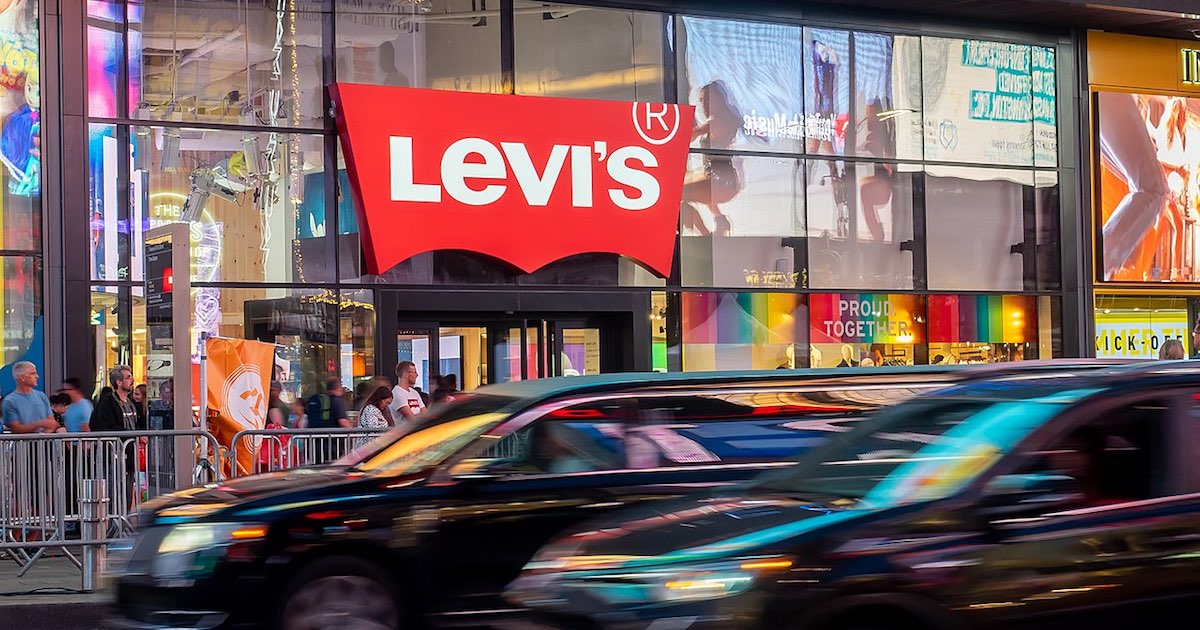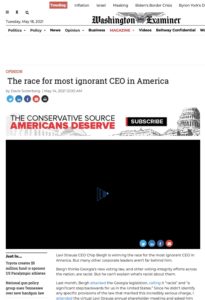
06 Jun 2021 What CEOs Don’t Know Can Hurt Business
 Free Enterprise Project (FEP) Research Associate Davis Soderberg identifies Levi Strauss & Co. CEO Chip Bergh as the current frontrunner for “most ignorant CEO in America.”
Free Enterprise Project (FEP) Research Associate Davis Soderberg identifies Levi Strauss & Co. CEO Chip Bergh as the current frontrunner for “most ignorant CEO in America.”
In a commentary published by the Washington Examiner, Davis says Bergh earned this distinction by labelling Georgia’s voter integrity laws – and others offered across the nation – as racist despite the fact that he “can’t explain what’s racist about them.”
This is troubling because Levi Strauss and other companies are opposing these protections as part of their loyalty to the left’s political agenda.
Davis declares about these woke CEOs:
Shareholders are sick of their incoherent political interference.
Davis is able to make this pronouncement about Bergh because he tested the CEO’s political IQ and found it to be lacking. At this year’s Levi’s shareholder meeting, Davis challenged Bergh’s assertion that Georgia’s new ballot protections are “racist” and “a significant step backward”:
My question to Bergh focused in part on the central feature of the law, voter identification: “Can you, Mr. Bergh, explain specifically how requiring voters to show ID in order to avoid fraud is racist, and also your timeline for ending all Levi-Strauss requests for ID from job candidates, employees, visitors to your facilities, and attendees at your annual shareholder meetings, in conformance with your race-based claims?”
Bergh repeated the notion that the legislation was racist, but, again, didn’t explain how. In fact, the only specific thing he mentioned was to concede (I think) that requiring voter ID, which is provided for free in Georgia, is not racist. But that leads to the question: If not the ID, then which provision in the legislation does facilitate racism and voter suppression? This is an immensely important detail that Bergh and other woke CEOs continue to leave out
In the case of the Georgia law, the left complains about limiting the number of ballot drop boxes even though these boxes were always intended to be a 2020 COVID-related exception. And the new law provides adequate early voting opportunities while protecting ballot integrity by verifying identities through government-issued identification. Contrary to leftist complaints, food and drinks can still be distributed in voting lines, as long as they are not given out by campaign operatives in a way that could be construed as buying votes.
Yet the left insists that ballot protections are bad. And too many companies have followed the left down this path by criticizing voter protection legislation. This creates a reputational problem for CEOs when they have to defend their actions. As Davis points out, FEP brought up the details of the bills and challenged CEOs at Coca-Cola, Bank of America and Pfizer about them – only to have them back away from their extremist positions:
[A]ll three of them, as well as hundreds of other corporations, have been foolish by preemptively demonizing the law as racist and unjust while simultaneously failing to pinpoint specific details, provisions, or clauses within the law that would back up these claims and make them legitimate.
Perhaps, Davis concludes, corporations should remain neutral and stay out of divisive politics:
Chip Bergh and his band of CEO race-baiters don’t appear to know what they’re talking about. Maybe they should start acting like nonpartisan business leaders who are focused solely on the success of their companies, about which they presumably know something. Corporate managers are paid to be successful at selling jeans and bubbly dark soda, not to understand legislative matters.
To read all of this commentary – “The Race for the Most Ignorant CEO in America” – click here.




